TRANSPARENCIES
a monthly newsletter from Integral Care
a monthly newsletter from Integral Care

Despite the challenges our community faced this year, Integral Care remained focused on supporting the health and well-being of our community and those we serve. As 2021 comes to an end, I would like to celebrate the incredible work of our dedicated staff and look back at some of the ways Integral Care created value, innovated, and collaborated to address the needs of all communities in Travis County. These areas of focus are goals set forth in our Strategic Plan and guide our work every day.
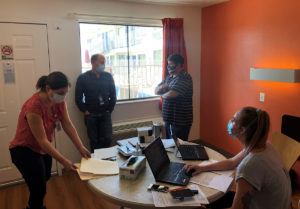
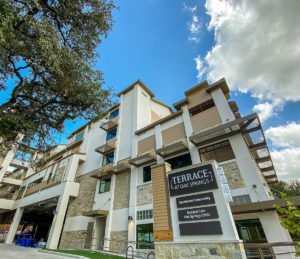
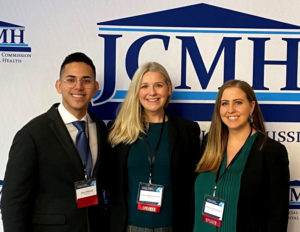
I am truly proud of our team and the progress and accomplishments our agency achieved this year. Integral Care is looking ahead to a bright 2022 as we strive to achieve our vision of Healthy Living for Everyone in Austin-Travis County.

David Evans
Chief Executive Officer
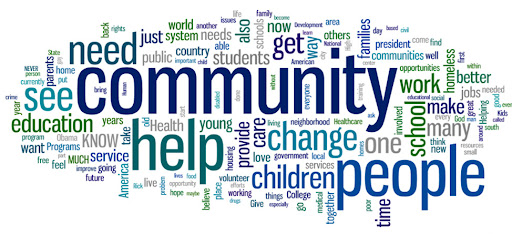
One key strategy to achieving racial equity in health and health care is utilizing data to identify, monitor and respond to racial disparities. Integral Care is working to identify and address gaps in data, ensuring that racial equity data is tracked and monitored for all programs, workforce, and services. This data will allow us to thoroughly review service delivery and ensure equitable access to prevention, treatment and recovery services.
Integral Care’s Diversity and Inclusion Council has worked with our Population Health Administrator to develop a Health Disparities Report Card. The report card covers 19 health conditions and risk factors, and is stratified by service division, gender identity, race/ethnicity, and primary language, to identify health disparities specifically within the Integral Care client population. Conditions analyzed include mental health and substance use diagnoses, chronic medical conditions, high risk drivers such as homelessness, hospitalization, justice involvement, and tobacco use; as well as mortality rates and COVID-19 infection rates.
With that report card and other tools, we are using data to investigate potential inequities and gaps in care across the system, and to enact change across the agency, including an effort to identify and mediate diagnostic racial disparities among African American, Hispanic/Latinx, Indigenous, and Asian American/Pacific Islander clients.
This fall, Integral Care’s Population Health Administrator produced an analysis of oppositional defiant disorder (ODD) and conduct disorder (CD) diagnoses among children and youth. Studies indicate that diagnostic and implicit bias contribute to higher rates of these diagnoses among racial minorities, leading to differences in diagnosis and appropriate treatment. As of August 2020, Integral Care’s service data reflected this disparity with Hispanic children representing more than half of all active ODD and CD diagnoses and African American children representing one-third of all such diagnoses. In any given year, two-thirds of all ODD and CD diagnoses are assigned to Black, Indigenous, and People of Color (BIPOC) clients.

Informed by this data, Integral Care launched new clinical initiatives to address diagnostic disparities among BIPOC youth. Since 2019, the rate of diagnoses assigned to BIPOC clients has decreased by 11%. This year, the overall rate of new oppositional defiant disorder and conduct disorder diagnoses dropped, with the largest decreases observed among BIPOC children and youth, decreasing the disproportionality gap.
Clinical initiatives include
The Population Health Administrator also performed an in-depth analysis of the 1,417 criminal justice involved individuals served by our ANEW and Mental Health Bond programs in Fiscal Year 2020. ANEW provides mental health support for adults on probation or parole. The Mental Health Bond Program helps people who are currently in the county jail by providing treatment alternatives to incarceration.
Multiple studies on implicit bias have shown that Black patients are more likely to be (mis)diagnosed with schizophrenia than non-Hispanic white patients when accounting for symptomatology using standardized diagnostic criteria. The chart below shows the racial disparity in our client population.
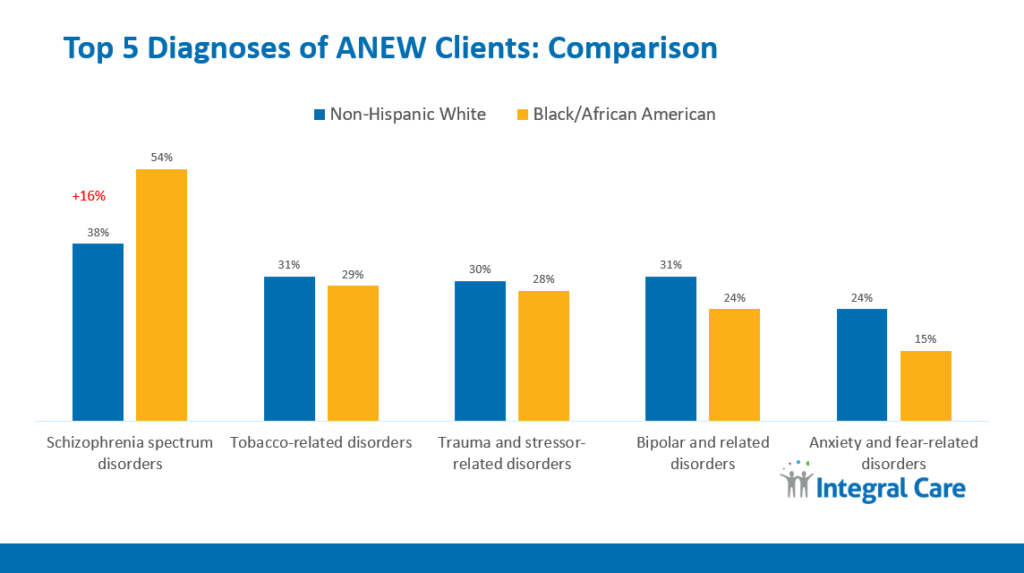
We presented our findings to leadership from Travis County Probation, Travis County Pre-Trial Services, Texas Department of Criminal Justice Parole and Travis County Jail and initiated conversation about strategies to address the array of racial disparities in the local criminal justice system of care. Since the study was completed, we have:
We are beginning to address diagnostic disparities, including the high prevalence of schizophrenia amongst people of color, by utilizing data to track progress and continue to assess the need for trainings, collaborations, and changes for the ANEW and Mental Health Bond programs.
Addressing disparities in health and health care is important not only from an equity standpoint, but also for improving health more broadly by achieving improvements in overall quality of care and population health. This is all part of our vision of Healthy Living for Everyone.
60 Minutes recently highlighted the work Integral Care and the Austin Police Department are doing to help ensure people experiencing a mental health crisis get the right care at the right time. Their report examined how American cities can reimagine police departments, with Austin as a leading example.
So far this year, 5,048 calls to 911 have been transferred to Integral Care clinicians embedded on the 911 Call Center floor. We diverted over 80% of those calls from police response. With our experts answering mental health calls, police are left to focus on public safety. Here’s what a recent caller had to say about her experience. She called during a family intervention for her daughter.
I didn’t know what was going to happen calling 911. The clinician was so knowledgeable, and I felt like I had someone there, right there with me. I don’t know what I would’ve done without her. She was the calm in the storm, guiding my entire family through the most chaotic and emotional day. That call is what got my daughter to go for psychiatric treatment voluntarily.
It was exactly 2 years ago that our Expanded Emergency Mobile Crisis Outreach Team began taking calls at the 911 Call Center. In February of this year, Austin became the first in the nation to add mental health to the 911 caller prompt menu, asking, “Are you calling for police, fire, EMS or mental health services?” Integral Care is honored to be part of Austin’s emergency system of care.
November 2021: Action Steps Toward Preventing and Ending Homelessness
October 2021: Language Access & Racial Equity
September 2021: Treatment & Addiction Psychiatry at Integral Care
August 2021: Returning to School plus the Legislative Wrap-up
July 2021: Creating Lasting Change for BIPOC Mental Health
June 2021: Facts & Resources This Pride Month
May 2021: Mental Health Month
April 2021: How do we help Austinites experiencing homelessness?
March 2021: Growth and Positive Change
February 2021: How Do We Create a Better Future?
January 2021: Looking Ahead to the Legislative Session
December 2020: Supporting Your Mental Health This Winter
November 2020: How do we rebuild health and well-being during a pandemic?
October 2020: With Collaboration Comes Innovation
September 2020: Success Stories of Recovery and Suicide Prevention
August 2020: A Back to School Season Like Never Before
July 2020: Minority Health Disparities & COVID-19
June 2020: Stronger Together
May 2020: Surviving and Thriving During Uncertain Times
April 2020: Persevering During COVID-19
March 2020: Collaborations and Initiatives to Improve Health for the IDD Population
February 2020:Solutions to Health and Health Care Disparities
January 2020: Sucicide Prevention a Local Effort
December 2019: A Year of Thriving Care & Collaboration
November 2019: Teamwork and Collaboration Impact Homelessness in Travis County
October 2019:Making Strides for World Mental Health
September 2019: Taking Steps to Recovery Support
August 2019: Working Together for Child & Youth Mental Health
July 2019: Legislative Wrap-Up – Some Bipartisan Wins for Healthcare
June 2019: Strengthening Access for Veterans and the Entire Military Family
May 2019: Women and Mental Health
April 2019: Legislative Session Status Report
March 2019: Making Opportunities for Recovery More Accessible
February 2019: Recovery is Possible
January 2019: Stronger Outcomes Through Collaboration
December 2018: Looking ahead to the 86th Texas Legislature
November 2018: How Tech is Changing the Face of Mental Health
October 2018: A Few Questions Could Help Save a Life
September 2018: Anyone Can Save a Life
August 2018: A Milestone Moment
July 2018: Equity in Mental Health Care for All
June 2018: Expanding Services for Veterans
May 2018: Your Mental Health Toolkit
April 2018: Time of Terror Calls for Increased Emotional Support
March 2018: Stopping the cycle of incarceration for individuals with mental illness
February 2018: Equity in mental healthcare for everyone
January 2018 : Improving Mental Health Through Partnership & Collaboration
December 2017: Strength Through Community
November 2017 : Healthy Lifestyles Improve Well-Being
October 2017 : National Child Health Day
September 2017 : Strengthening Families and Communities
Integral Care was a runner up in the Mental Health Care category of the Austin American-Statesman and austin360.com 2021 Best of the Best – Austin’s Official Community Choice Awards.
We invite you to join us for our monthly Board, PNAC (Planning, Network, and Advisory Committee), and Finance meetings. Meetings are open to the public and agendas are posted here.
Register now for the longest running Black wellness conference of its kind – Feb 8-9, 2022. Join us virtually for workshops, keynote speakers, and group discussions on mental health, substance use disorders, and intellectual and developmental disabilities in the African American community.
HHSC has awarded Integral Care a two-year grant of $155,329 to support Children’s Mental Health System Navigation. This project will support children and youth who interact with different child-serving systems and enhance services for high-risk children and youth by creating and strengthening relationships with community partners.